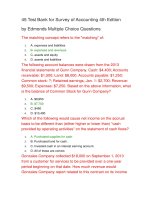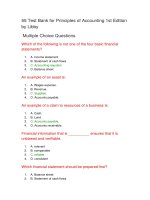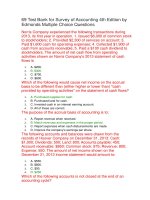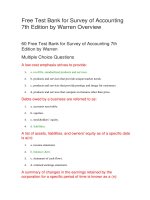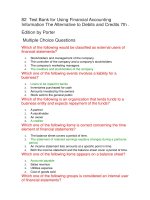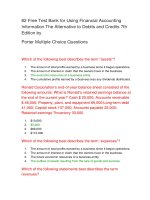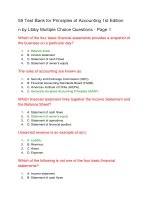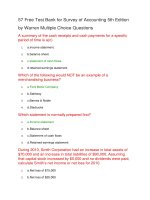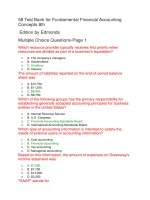Test bank for advanced financial accounting 10th edition
Bạn đang xem bản rút gọn của tài liệu. Xem và tải ngay bản đầy đủ của tài liệu tại đây (114.25 KB, 18 trang )
Test Bank for Advanced Financial Accounting 10th
Edition
Plummet Corporation reported the book value of its net assets at
$400,000 when Zenith Corporation acquired 100 percent ownership.
The fair value of Plummet's net assets was determined to be
$510,000 on that date. Based on the preceding information, what
amount of goodwill will be reported in consolidated financial
statements presented immediately following the combination if Zenith
paid $550,000 for the acquisition?
1.
A. $0
2.
B. $50,000
3.
C. $150,000
4.
D. $40,000
Assuming no impairment in value prior to transfer, assets transferred
by a parent company to another entity it has created should be
recorded by the newly created entity at the assets':
1.
A. cost to the parent company.
2.
B. book value on the parent company's books at the date of transfer.
3.
C. fair value at the date of transfer.
4.
D. fair value of consideration exchanged by the newly created entity.
Note: This is a Kaplan CPA Review Question On August 31, 20X1,
Wood Corp. issued 100,000 shares of its $20 par value common
stock for the net assets of Pine, Inc. in a business combination
accounted for by the acquisition method. The market value of Wood's
common stock on August 31 was $36 per share. Wood paid a fee of
$160,000 to the consultant who arranged this acquisition. Costs of
registering and issuing the equity securities amounted to $80,000. No
goodwill was involved in the purchase. What amount sho
1.
A. $3,680,000
2.
B. $3,600,000
3.
C. $3,760,000
4.
D. $3,840,000
Public Equity Corporation acquired Lenore Company through an
exchange of common shares. All of Lenore's assets and liabilities
were immediately transferred to Public Equity. Public's common
stock was trading at $20 per share at the time of exchange.
Following selected information is also available: Par value of shares
outstanding: $200,000 ( Before acquisition), $250,000 (After
acquisition); addtional paid- in capital: $350,000 ( Before acquisition),
$550,000 (After acquisition) Based on the preceding infor
1.
A. 5,000
2.
B. 17,500
3.
C. 12,500
4.
D. 10,000
Rivendell Corporation and Foster Company merged as of January 1,
20X9. To effect the merger, Rivendell paid finder's fees of $40,000,
legal fees of $13,000, audit fees related to the stock issuance of
$10,000, stock registration fees of $5,000, and stock listing
application fees of $4,000. Based on the preceding information,
under the acquisition method, what amount relating to the business
combination would be expensed?
1.
A. $72,000
2.
B. $19,000
3.
C. $53,000
4.
D. $63,000
Given the increased development of complex business structures,
which of the following regulators is responsible for the continued
usefulness of accounting reports?
1.
A. Securities and Exchange Commission (SEC)
2.
B. Public Company Accounting Oversight Board (PCAOB)
3.
C. Financial Accounting Standards Board (FASB)
4.
D. All of these
In order to reduce the risk associated with a new line of business,
Conservative Corporation established Spin Company as a wholly
owned subsidiary. It transferred assets and accounts payable to Spin
in exchange for its common stock. Spin recorded the following entry
when the transaction occurred: Cash and receivables: 23,000;
Inventory: 15,000; Land: 30,000; Buildings: 100,000; Equiment:
95,000; Accounts Payable: 20,000; Accumulated DepreciationBuidings: 32,000; Accumulated Depreciation- Equipments: 30,00
1.
A. Conservative's total assets decreased by $23,000.
2.
B. Conservative's total assets decreased by $20,000.
3.
C. Conservative's total assets increased by $56,000.
4.
D. Conservative's total assets remained the same.
Following its acquisition of the net assets of Dan Company, Empire
Company assigned goodwill of $60,000 to one of the reporting
divisions. Information for this division follows: Cash:$20,000
(Carrying Amount), $20,000 (Fair Value); Inventory: $35,000
(Carrying Amount), $40,000 (Fair Value); Equipment: $125,000
(Carrying Amount), $160,000 (Fair Value);Goodwill:$60,000
(Carrying Amount), (Fair Value); Accounts Payable: $30,000
(Carrying Amount), $30,000 (Fair Value) Based on the preceding
information, what a
1.
A. $0
2.
B. $60,000
3.
C. $30,000
4.
D. $10,000
Which of the following situations best describes a business
combination to be accounted for as a statutory merger?
1.
A. Both companies in a combination continue to operate as separate, but
related, legal entities.
2.
B. Only one of the combining companies survives and the other loses its
separate identity.
3.
C. Two companies combine to form a new third company, and the original two
companies are dissolved.
4.
D. One company transfers assets to another company it has created.
In order to reduce the risk associated with a new line of business,
Conservative Corporation established Spin Company as a wholly
owned subsidiary. It transferred assets and accounts payable to Spin
in exchange for its common stock. Spin recorded the following entry
when the transaction occurred: Cash and receivables: 23,000;
Inventory: 15,000; Land: 30,000; Buildings: 100,000; Equiment:
95,000; Accounts Payable: 20,000; Accumulated DepreciationBuidings: 32,000; Accumulated Depreciation- Equipments: 30,00
1.
A. $181,000
2.
B. $221,000
3.
C. $263,000
4.
D. $243,000
Which of the following observations refers to the term differential?
1.
A. Excess of consideration exchanged over fair value of net identifiable assets.
2.
B. Excess of fair value over book value of net identifiable assets.
3.
C. Excess of consideration exchanged over book value of net identifiable
assets.
4.
D. Excess of fair value over historical cost of net identifiable assets.
A statutory consolidation is a type of business combination in which:
1.
A. one of the combining companies survives and the other loses its separate
identity.
2.
B. one company acquires the voting shares of the other company and the two
companies continue to operate as separate legal entities.
3.
C. two publicly traded companies agree to share a board of directors.
4.
D. each of the combining companies is dissolved and the net assets of both
companies are transferred to a newly created corporation.
A business combination in which the acquired company's assets and
liabilities are combined with those of the acquiring company into a
single entity is defined as:
1.
A. Stock acquisition
2.
B. Leveraged buyout
3.
C. Statutory Merger
4.
D. Reverse statutory rollup
Following its acquisition of the net assets of Dan Company, Empire
Company assigned goodwill of $60,000 to one of the reporting
divisions. Information for this division follows: Cash:$20,000
(Carrying Amount), $20,000 (Fair Value); Inventory: $35,000
(Carrying Amount), $40,000 (Fair Value); Equipment: $125,000
(Carrying Amount), $160,000 (Fair Value);Goodwill:$60,000
(Carrying Amount), (Fair Value); Accounts Payable: $30,000
(Carrying Amount), $30,000 (Fair Value) Based on the preceding
information, what a
1.
A. $0
2.
B. $5,000
3.
C. $60,000
4.
D. $55,000
Plummet Corporation reported the book value of its net assets at
$400,000 when Zenith Corporation acquired 100 percent ownership.
The fair value of Plummet's net assets was determined to be
$510,000 on that date. Based on the preceding information, what
amount of goodwill will be reported in consolidated financial
statements presented immediately following the combination if Zenith
paid $500,000 for the acquisition?
1.
A. $0
2.
B. $50,000
3.
C. $150,000
4.
D. $40,000
Pursuing an inorganic growth strategy, Wilson Company acquired
Venus Company's net assets and assigned them to four separate
reporting divisions. Wilson assigned total goodwill of $134,000 to the
four reporting divisions as given below: Carrying value: $200,000
( Alpha), $320,000 (Beta), $370,000 (Gamma), $300,000 (Delta);
Goodwill included in carrying value: $20,000 ( Alpha), $34,000
(Beta), $50,000 (Gamma), $30,000 (Delta); Fair value of net
identifiable assets at year-end: $150,000 ( Alpha), $300,000 (B
1.
A. $0
2.
B. $69,000
3.
C. $79,000
4.
D. $94,000
Pursuing an inorganic growth strategy, Wilson Company acquired
Venus Company's net assets and assigned them to four separate
reporting divisions. Wilson assigned total goodwill of $134,000 to the
four reporting divisions as given below: Carrying value: $200,000
( Alpha), $320,000 (Beta), $370,000 (Gamma), $300,000 (Delta);
Goodwill included in carrying value: $20,000 ( Alpha), $34,000
(Beta), $50,000 (Gamma), $30,000 (Delta); Fair value of net
identifiable assets at year-end: $150,000 ( Alpha), $300,000 (B
1.
A. $0
2.
B. $14,000
3.
C. $34,000
4.
D. $50,000
Pursuing an inorganic growth strategy, Wilson Company acquired
Venus Company's net assets and assigned them to four separate
reporting divisions. Wilson assigned total goodwill of $134,000 to the
four reporting divisions as given below: Carrying value: $200,000
( Alpha), $320,000 (Beta), $370,000 (Gamma), $300,000 (Delta);
Goodwill included in carrying value: $20,000 ( Alpha), $34,000
(Beta), $50,000 (Gamma), $30,000 (Delta); Fair value of net
identifiable assets at year-end: $150,000 ( Alpha), $300,000 (Be
1.
A. $0
2.
B. $20,000
3.
C. $30,000
4.
D. $10,000
The fair value of net identifiable assets of a reporting unit of X
Company is $300,000. On X Company's books, the carrying value of
this reporting unit's net assets is $350,000, including $60,000
goodwill. If the fair value of the reporting unit as a whole is $335,000,
what amount of goodwill impairment will be recognized for this unit?
1.
A. $0
2.
B. $10,000
3.
C. $25,000
4.
D. $35,000
For all acquired contingencies, the acquirer should do all of the
following except:
1.
A. Provide documentation from the acquirer's attorney regarding pending
lawsuits and loan guarantees
2.
B. Provide a description of each contingency
3.
C. Disclose the amount recognized at the acquisition date
4.
D. Describe the estimated range of possible undiscounted outcomes of the
contingency
ASC 805 requires that ongoing research and development projects
be treated in all of the following ways except:
1.
A. Recorded at acquisition-date fair values
2.
B. Classified as intangible assets having indefinite lives
3.
C. Expensed immediately
4.
D. Tested for impairment periodically.
Public Equity Corporation acquired Lenore Company through an
exchange of common shares. All of Lenore's assets and liabilities
were immediately transferred to Public Equity. Public's common
stock was trading at $20 per share at the time of exchange.
Following selected information is also available: Par value of shares
outstanding: $200,000 ( Before acquisition), $250,000 (After
acquisition); addtional paid- in capital: $350,000 ( Before acquisition),
$550,000 (After acquisition) Based on the preceding infor
1.
A. $306,000
2.
B. $244,000
3.
C. $194,000
4.
D. $300,000
During its inception, Devon Company purchased land for $100,000
and a building for $180,000. After exactly 3 years, it transferred these
assets and cash of $50,000 to a newly created subsidiary, Regan
Company, in exchange for 15,000 shares of Regan's $10 par value
stock. Devon uses straight-line depreciation. Useful life for the
building is 30 years, with zero residual value. An appraisal revealed
that the building has a fair value of $200,000. Based on the
information provided, what amount would be reporte
1.
A. $312,000
2.
B. $180,000
3.
C. $330,000
4.
D. $150,000
Big Company acquired the following assets and liabilities of Little
Company (fair values listed below) for $470,000 cash: Inventory:
$70,000; Land: 100,000; Buildings and Equipment: 320,000; Current
liabilities: 50,000.Assuming these items are all recorded at their
acquisition date fair values, what additional item needs to be
recorded and how will it be accounted for in the future?
1.
A. $30,000 Goodwill, capitalized and tested for impairment
2.
B. $30,000 Bargain purchase, recognized in current earnings
3.
C. $30,000 Bargain purchase, capitalized and recognized over time
4.
D. $30,000 Goodwill, capitalized and amortized over time
During its inception, Devon Company purchased land for $100,000
and a building for $180,000. After exactly 3 years, it transferred these
assets and cash of $50,000 to a newly created subsidiary, Regan
Company, in exchange for 15,000 shares of Regan's $10 par value
stock. Devon uses straight-line depreciation. Useful life for the
building is 30 years, with zero residual value. An appraisal revealed
that the building has a fair value of $200,000. Based on the
preceding information, Regan Company will report
1.
A. additional paid-in capital of $0.
2.
B. additional paid-in capital of $150,000.
3.
C. additional paid-in capital of $162,000.
4.
D. additional paid-in capital of $180,000.
The length of the measurement period allowed to value the assets
and liabilities in an acquired business combination starts on the date
of acquisition and lasts until:
1.
A. All necessary information about the facts of the acquisition is obtained
2.
B. All necessary information about the facts of the acquisition is obtained, not to
exceed one month
3.
C. All necessary information about the facts of the acquisition is obtained, not to
exceed one reporting period
4.
D. All necessary information about the facts of the acquisition is obtained, not to
exceed one year
Public Equity Corporation acquired Lenore Company through an
exchange of common shares. All of Lenore's assets and liabilities
were immediately transferred to Public Equity. Public's common
stock was trading at $20 per share at the time of exchange.
Following selected information is also available: Par value of shares
outstanding: $200,000 ( Before acquisition), $250,000 (After
acquisition); addtional paid- in capital: $350,000 ( Before acquisition),
$550,000 (After acquisition) Based on the preceding infor
1.
A. $10
2.
B. $1
3.
C. $5
4.
D. $4
Point Co. purchased 90% of Sharpe Corp.'s voting stock on January
1, 20X2 for $5,580,000. Prior to the acquisition, Point held a 10%
equity position in Sharpe Company. On January 1, 20X2 Pointe's
10% investment in Sharpe has a book value of $340,000 and a fair
value of $620,000. On January 1, 20X2 Point records the following:
1.
A. Debit Gain on revaluation of Sharpe's stock $280,000
2.
B. Credit Gain on revaluation of Sharpe's stock $280,000
3.
C. Credit Investment in Sharpe stock $5,860,000
4.
D. Debit Investment in Sharpe stock $6,200,000
Pursuing an inorganic growth strategy, Wilson Company acquired
Venus Company's net assets and assigned them to four separate
reporting divisions. Wilson assigned total goodwill of $134,000 to the
four reporting divisions as given below: Carrying value: $200,000
( Alpha), $320,000 (Beta), $370,000 (Gamma), $300,000 (Delta);
Goodwill included in carrying value: $20,000 ( Alpha), $34,000
(Beta), $50,000 (Gamma), $30,000 (Delta); Fair value of net
identifiable assets at year-end: $150,000 ( Alpha), $300,000 (B
1.
A. no goodwill should be reported at year-end.
2.
B. goodwill impairment of $30,000 should be recognized at year-end.
3.
C. goodwill impairment of $20,000 should be recognized at year-end.
4.
D. goodwill of $30,000 should be reported at year-end.
The fair value of net identifiable assets of a reporting unit of Y
Company is $270,000. The carrying value of the reporting unit's net
assets on Y Company's books is $320,000, including $50,000
goodwill. If the reported goodwill impairment for the unit is $10,000,
what would be the fair value of the reporting unit?
1.
A. $320,000
2.
B. $310,000
3.
C. $270,000
4.
D. $290,000
Plummet Corporation reported the book value of its net assets at
$400,000 when Zenith Corporation acquired 100 percent ownership.
The fair value of Plummet's net assets was determined to be
$510,000 on that date. Based on the preceding information, what
amount will be recorded by Zenith as its investment in Plummet, if it
paid $500,000 for the acquisition?
1.
A. $610,000
2.
B. $400,000
3.
C. $500,000
4.
D. $510,000
In order to reduce the risk associated with a new line of business,
Conservative Corporation established Spin Company as a wholly
owned subsidiary. It transferred assets and accounts payable to Spin
in exchange for its common stock. Spin recorded the following entry
when the transaction occurred: Cash and receivables: 23,000;
Inventory: 15,000; Land: 30,000; Buildings: 100,000; Equiment:
95,000; Accounts Payable: 20,000; Accumulated DepreciationBuidings: 32,000; Accumulated Depreciation- Equipments: 30,00
1.
A. 10,000
2.
B. 7,000
3.
C. 8,000
4.
D. 25,000
Following its acquisition of the net assets of Dan Company, Empire
Company assigned goodwill of $60,000 to one of the reporting
divisions. Information for this division follows: Cash:$20,000
(Carrying Amount), $20,000 (Fair Value); Inventory: $35,000
(Carrying Amount), $40,000 (Fair Value); Equipment: $125,000
(Carrying Amount), $160,000 (Fair Value);Goodwill:$60,000
(Carrying Amount), (Fair Value); Accounts Payable: $30,000
(Carrying Amount), $30,000 (Fair Value) Based on the preceding
information, what a
1.
A. $5,000
2.
B. $30,000
3.
C. $60,000
4.
D. $55,000
ASC 805 requires contingent consideration in a business
combination to be classified as:
1.
A. An asset
2.
B. A liability or equity
3.
C. An asset or equity
4.
D. An asset or a liability
Pursuing an inorganic growth strategy, Wilson Company acquired
Venus Company's net assets and assigned them to four separate
reporting divisions. Wilson assigned total goodwill of $134,000 to the
four reporting divisions as given below: Carrying value: $200,000
( Alpha), $320,000 (Beta), $370,000 (Gamma), $300,000 (Delta);
Goodwill included in carrying value: $20,000 ( Alpha), $34,000
(Beta), $50,000 (Gamma), $30,000 (Delta); Fair value of net
identifiable assets at year-end: $150,000 ( Alpha), $300,000 (B
1.
A. no goodwill should be reported at year-end.
2.
B. goodwill impairment of $15,000 should be recognized at year-end.
3.
C. goodwill impairment of $20,000 should be recognized at year-end.
4.
D. goodwill of $30,000 should be reported at year-end.
Which of the following observations concerning "goodwill" is NOT
correct?
1.
A. Once written down, it may be written up for recoveries.
2.
B. It must be tested for impairment at least annually.
3.
C. Goodwill impairment losses are recognized in income from continuing
operations or income before extraordinary gains and losses.
4.
D. It must be reported as a separate line item in the balance sheet.
Burrough Corporation paid $80,000 to acquire all of Helyar
Company's net assets. Helyar reported assets with a book value of
$60,000 and fair value of $98,000 and liabilities with a book value
and fair value of $23,000 on the date of combination. Burrough also
paid $3,000 to a search firm for finder's fees related to the
acquisition. What amount will be recorded as goodwill by Burrough
Corporation while recording its investment in Helyar?
1.
A. $0
2.
B. $5,000
3.
C. $8,000
4.
D. $13,000
During its inception, Devon Company purchased land for $100,000
and a building for $180,000. After exactly 3 years, it transferred these
assets and cash of $50,000 to a newly created subsidiary, Regan
Company, in exchange for 15,000 shares of Regan's $10 par value
stock. Devon uses straight-line depreciation. Useful life for the
building is 30 years, with zero residual value. An appraisal revealed
that the building has a fair value of $200,000. Based on the
information provided, at the time of the transfer,
1.
A. Building at $180,000 and no accumulated depreciation.
2.
B. Building at $162,000 and no accumulated depreciation.
3.
C. Building at $200,000 and accumulated depreciation of $24,000.
4.
D. Building at $180,000 and accumulated depreciation of $18,000.
In order to reduce the risk associated with a new line of business,
Conservative Corporation established Spin Company as a wholly
owned subsidiary. It transferred assets and accounts payable to Spin
in exchange for its common stock. Spin recorded the following entry
when the transaction occurred: Cash and receivables: 23,000;
Inventory: 15,000; Land: 30,000; Buildings: 100,000; Equiment:
95,000; Accounts Payable: 20,000; Accumulated DepreciationBuidings: 32,000; Accumulated Depreciation- Equipments: 30,00
1.
A. $243,000
2.
B. $263,000
3.
C. $221,000
4.
D. $201,000
Paul Corp. acquired 100 percent of Sam Inc.'s voting stock on July 1,
20X1. The following information was available as of December 31,
20X1: Paul Corp: $300,000 (Net Income: Jan1-June 30, 20X1),
$420,000 (Net Income: July 1, 20X1- Dec 31, 20X1); Sam Inc:
$150,000 (Net Income: Jan1-June 30, 20X1), $220,000 (Net Income:
July 1, 20X1- Dec 31,20X1). How much net income should be
reported in Paul Corp's income statement for 20X1?
1.
A. $370,000
2.
B. $720,000
3.
C. $940,000
4.
D. $1,090,000
In which of the following situations do accounting standards not
require that the financial statements of the parent and subsidiary be
consolidated:
1.
A. A corporation creates a new 100 percent owned subsidiary
2.
B. A corporation purchases 90 percent of the voting stock of another company
3.
C. A corporation has both control and majority ownership of an unincorporated
company
4.
D. A corporation owns less-than a controlling interest in an unincorporated
company
Which of the following observations is (are) consistent with the
acquisition method of accounting for business combinations? I.
Expenses related to the business combination are expensed; II.
Stock issue costs are treated as a reduction in the issue price; III. All
merger and stock issue costs are expensed; IV. No goodwill is ever
recorded.
1.
A. III
2.
B. IV
3.
C. I and II
4.
D. I, II, and IV
Rivendell Corporation and Foster Company merged as of January 1,
20X9. To effect the merger, Rivendell paid finder's fees of $40,000,
legal fees of $13,000, audit fees related to the stock issuance of
$10,000, stock registration fees of $5,000, and stock listing
application fees of $4,000. Based on the preceding information,
under the acquisition method:
1.
A. $72,000 of stock issue costs are treated as goodwill.
2.
B. $19,000 of stock issue costs are treated as a reduction in the issue price.
3.
C. $19,000 of stock issue costs are expensed.
4.
D. $72,000 of stock issue costs are expensed.
